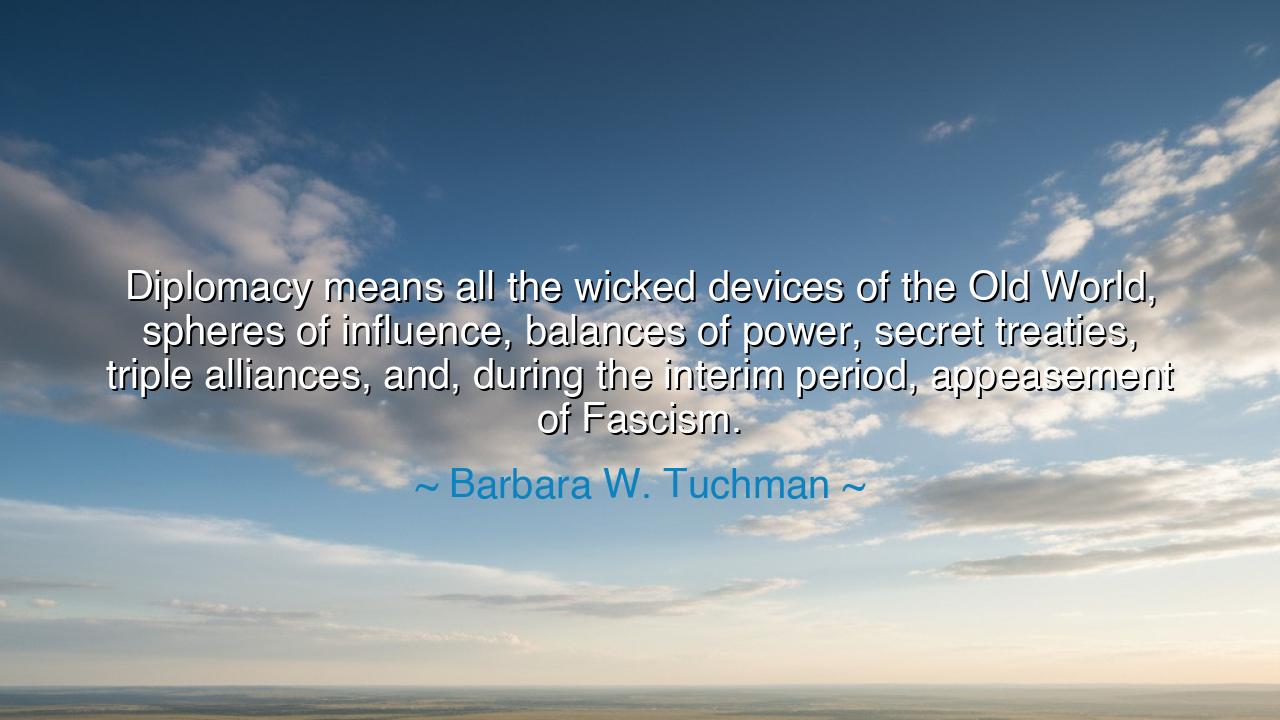
Diplomacy means all the wicked devices of the Old World, spheres
Diplomacy means all the wicked devices of the Old World, spheres of influence, balances of power, secret treaties, triple alliances, and, during the interim period, appeasement of Fascism.






Hear me, O children of the future, for I speak of the art of diplomacy, that ancient practice woven with both wisdom and deception, where the spheres of influence, the balances of power, and the hidden treaties of rulers shape the fate of nations. Barbara W. Tuchman has spoken clearly: "Diplomacy means all the wicked devices of the Old World, spheres of influence, balances of power, secret treaties, triple alliances, and, during the interim period, appeasement of Fascism." These words carry a great burden, for they reveal the darker side of political maneuvering—a side of diplomacy that hides behind noble words, yet is marked by manipulation and the suppression of truth for the sake of power.
Consider, O children, the ancient rulers who played the game of power with both grandeur and deceit. Thucydides, the historian of Athens, wrote of the great Peloponnesian War, where the Delian League, once meant to unite the Greek city-states against a common enemy, became an instrument of domination, each city seeking to extend its own sphere of influence. The leaders of the time, though claiming to seek justice, were often moved by the allure of control, shaping alliances and forging secret treaties that served their own desires. This, my children, is the nature of diplomacy in the Old World—an intricate dance of power, where the illusion of peace often hides the seeds of war.
In more recent times, during the years leading to the Second World War, we see the tragic consequences of such diplomacy. The great powers of Europe, blinded by their own ambitions, sought to maintain the balance of power with the most dangerous of tools—appeasement. Neville Chamberlain, the British Prime Minister, entered into agreements with Hitler, believing that appeasing the dictator would prevent war. Yet, in his attempt to maintain peace, Chamberlain gave away pieces of his nation's soul, signing the Munich Agreement in 1938. What was meant to secure peace only emboldened the Fascist regime, leading directly to the devastation of war. This is the dark side of diplomacy: the misguided belief that peace can be won by yielding to evil.
Let us not forget the secret treaties that shaped the world behind closed doors. During the First World War, alliances were made and broken in the shadows, leading nations into war based not on the will of their people, but on the whispered promises of kings and ministers. The Triple Entente and the Triple Alliance were but instruments of secretive power plays, setting the stage for a conflict that could have been avoided if only the true intentions of each side were known. But diplomacy, in its most sinister form, thrives on secrecy and deception, and it is through such veiled agreements that entire nations are led into the flames of war.
So, O children, understand this: diplomacy, though necessary, is not always noble. It can be a tool of manipulation, where power is gained through hidden schemes and dangerous compromises. The balance of power, once seen as a safeguard, can easily tip into chaos if those who wield it do so with malice or self-interest. Appeasement may seem like a path to peace, but it often sows the seeds of destruction. And so, in your lives, when you encounter diplomacy—whether in politics, business, or the dealings of daily life—remember that truth and honesty must be the foundation. Only when these are upheld can the promises made in the name of peace ever be truly trusted.






T130 Doan Minh Tri 10G
I am intrigued by the historical specificity in the description—triple alliances, balances of power, and spheres of influence. I wonder how much of this is still relevant in today’s geopolitical landscape. Do modern diplomatic strategies merely cloak similar power plays in new terminology, or have norms shifted toward transparency and collective security? This quote challenges me to examine the continuity of tactics across time and to question whether ethical diplomacy is ever fully achievable in a world governed by competing national interests.
TQThanh Quang
This statement raises questions about the moral responsibility of statesmen. If diplomacy often involves cunning devices and temporary compromises, can leaders ever truly act with integrity? I also wonder whether the public perception of diplomacy aligns with this grim reality, or if governments deliberately obscure these complexities. It makes me reflect on how history judges these strategies: are appeasements of Fascism condemned purely for their outcomes, or also for the methods used in negotiation?
L117 Pham Thi Thuy Linh 11a5
I feel a sense of cynicism in this portrayal. The mention of appeasement and secret treaties evokes the failure to prevent catastrophic conflict. I’m curious whether Tuchman’s critique applies only to Fascist-era Europe or has broader implications for contemporary alliances. Are similar ‘spheres of influence’ still at work today in subtle forms? This makes me consider whether diplomacy is inherently manipulative or whether there is room for genuinely cooperative international engagement without hidden agendas.
THVY NGUYEN THI HOAI
Reading this, I’m struck by the historical weight behind the term 'diplomacy.' It seems to frame diplomacy not as noble negotiation but as a collection of manipulations and power plays. I wonder if the author sees this as an inevitable feature of international relations or a moral failure specific to the era she describes. Can modern diplomacy escape these patterns, or are these dynamics simply inherent in global politics? This makes me question how much ethical considerations shape foreign policy decisions.